Ninety-two years. Four schools. A satellite campus. Fully online degree programs. A beautiful grassy quadrangle and new suite-style residence hall. Partnerships with biotech companies, health care organizations, and universities around the world. The largest undergraduate and graduate classes in its history.
Amid recent headlines that paint a picture of small liberal arts colleges as “struggling,” Regis is proving just the opposite-thanks to an innovative vision and strategic decision-making by university leadership.
“Regis College is growing,” says President Antoinette M. Hays, PhD, RN. “Our revenue streams are diversified and not solely dependent on undergraduate enrollment. Two-thirds of our students are enrolled in on-campus and online graduate programs. We know that our broad offerings and increased focus on graduate programs are essential to our long-term financial growth.”
While President Hays agrees that colleges and universities of all sizes are facing a variety of challenges, she also knows that each institution is unique in terms of offerings and economic strength. “It is simply inaccurate to lump us into one failing category.”
Our campus may be small, but our ambitions and outcomes are not.
Antoinette M. Hays, PhD, RN - Regis President
In fall 2018, Regis welcomed the largest undergraduate class in its history, thanks to the addition of the Dental Hygiene program. The emphasis is on developing new academic programs and partnerships that align with industry needs. The School of Business and Communication-Regis’ fourth school-opened in September 2017. Also that year, the School of Heath Sciences added offerings in therapeutic recreation and sports management, and the School of Arts and Sciences added majors in cybersecurity and environmental sustainability. In 2015, Regis opened a satellite campus, Regis North, in Lawrence, Massachusetts, to offer bachelor completion.
Regis’ success is also founded on its thriving programs in nursing and other health-related fields. The Young School of Nursing (named in 2018 by Now We Fly campaign donor Brian Young in memory of his parents, trustee emeritus Richard “Dick” W. Young, PhD, and Sheila Young) was selected as one of the top 10 schools of nursing in New England by the Nursing Schools Almanac in 2019. The school continues to hold its prestigious designation as a Center of Excellence in Nursing Education by the National League of Nursing-an honor currently bestowed upon only 19 nursing schools in the country.
During Regis’ evolution-which includes a transition from an all-female to a coed institution in 2007-the university’s mission has remained constant.
“Students’ characters are forever shaped by the core values of our founders, the Sisters of Saint Joseph of Boston,” President Hays says. “Those brave women founded this institution in 1927 to create opportunities for the underserved.”
Today Regis lives out that mission by serving traditionally underrepresented populations, including many first-generation students.
“Graduates have gone on to have a major impact on the world,” President Hays continues. “So despite the headlines, don’t count us out. Regis and many of our peers are far from ‘struggling liberal arts colleges’ on the brink of closure. Our campus may be small, but our ambitions and outcomes are not.”
Undergraduate
Dean of Undergraduate Enrollment and Retention Laura Bertonazzi, EdD, says that Regis has developed an enrollment strategy that reflects a trend among national high school enrollment.
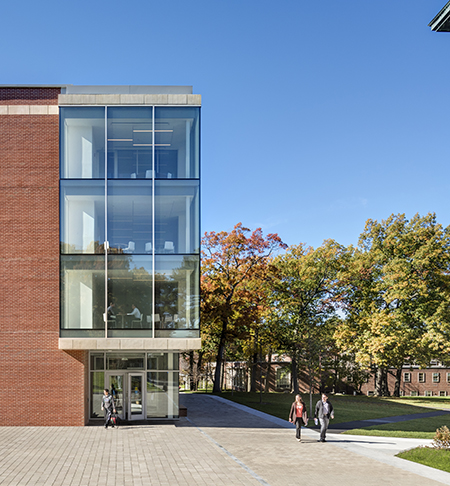 Photo: Anton Grassl
Photo: Anton Grassl
“The Office of Undergraduate Admission has developed application, event, travel, and marketing strategies that appeal to the contemporary high school student.”
The enhanced strategy was made possible by the creation of a singular Undergraduate Enrollment and Student Affairs division in 2016. Under the leadership of Vice President of Undergraduate Student Affairs and Enrollment Kara Kolomitz, EdD, the new division includes student life, enrollment, and athletics.
“This new structure has really enhanced the way that we can create and support a student-life experience from the prospective student stage through graduation,” says Bertonazzi.
The undergraduate enrollment team has been expanding recruitment efforts outside of the Northeast in California, Florida, Puerto Rico, and the Dominican Republic. They have also broadened the prestigious Presidential Catholic Schools Scholarship program to include a national pool of high school candidates, as well as introduced the Regis Diverse Educators Scholarship program, which provides full-tuition scholarship opportunities for students pursuing the study of education with a focus on underrepresented populations.
The new division has provided what Bertonazzi calls “incredible stabilization” in the staff, including the appointment of Regis’ first male dean of students Walt Horner and its inaugural dean of athletics Pam Roecker. “Repositioning within the GNAC [Great Northeast Athletic Conference, beginning academic year 2017-2018] aligned Regis with prominent institutions in the Northeast, which is appealing to the potential applicant and student-athlete who is seeking a Division III experience.”
This new structure has really enhanced the way that we can create and support a student-life experience from the prospective student stage through graduation.
Laura Bertonazzi ’03, EdD - Dean of Undergraduate Enrollment and Retention
From an academic standpoint, major changes include the addition of the Dental Hygiene program, the launch of the School of Business and Communication, new majors in therapeutic recreation and cybersecurity, and additional programming for pre-medical, pre-dental, and pre-veterinarian students. The combined bachelor’s/master’s degree program enables students to begin graduate studies as an undergraduate, allowing students to earn both a bachelor’s and master’s degree within certain programs in under five years rather than six or more.
“When we make decisions about program development, we holistically look at what we already have in place, areas where we want to expand, and the market need,” Bertonazzi says. “Growth in communication in the business world, in stem-related fields, and in allied health, for example.”
She adds that a “pivotal” piece of Regis’ success-including the enrollment process-is a dedicated marketing team under Vice President of Marketing and Communications Kelley Tuthill. “Getting the Regis story out there has been unbelievable,” Bertonazzi says, “and something we’re very excited about.”
Profile
Trevon Wright ’20
Major: Global Business Management
Hometown: Springfield, Massachusetts
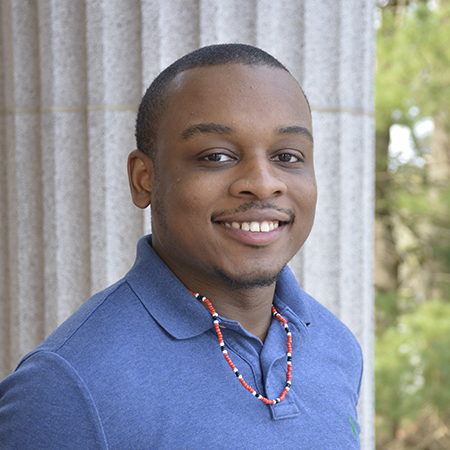 Photo: Anna Webster
Photo: Anna Webster
Why did you choose to come to Regis to pursue your education? I chose to come to Regis because I wanted to be closer to Boston with the opportunity to spread my wings and meet new people. When I first visited, I really liked the size of Regis and its close-knit community. No one was a stranger, everyone knew one another, and people here were kind and welcoming. My financial aid package made it possible for me to enroll.
What made you want to major in Global Business Management? I’ve always enjoyed business. Growing up, I worked with my dad and helped with his business-he owned multiple rental properties throughout Springfield, Massachusetts. I would keep track of the rent as well as apartments that needed repairs and which apartments were going to be inspected. It was something that he and I always did together.
Do you have anyone who has served as a mentor for you here at Regis? [Associate Professor of Humanities] Frans Rijnbout, PhD, was my academic adviser and mentor here. We met in his office every Friday for about an hour to talk about classes, work, and grades, and how I was balancing everything. But what I liked about it the most was that we didn’t only talk about classes and work. We talked about life, sometimes our families, even our different backgrounds and cultures. We would even crack jokes and just have a good time. This has definitely played a huge role in who I am today.
What has been your involvement in service? I have been involved in many different service opportunities here at Regis. Through the Center for Ministry and Service I’ve gone to Bethany Hill Place to help elementary and middle school students with homework, read, and play. I’ve done multiple events during Founders’ Day. I also attended a service trip to Los Angeles and the U.S.-Mexico border.
What has it been like to be a resident assistant (RA)? Being an RA is very challenging and requires a lot of time, effort, and responsibility-but it has also been very beneficial to me. This position increased my leadership and communication skills, and it taught me what it truly means to be a part of a team. It has also provided an incredible support system for me. I’ve been able to connect with residents on a level that I would have never imagined.
When you think about life after Regis, what does it look like? After I receive my bachelor’s degree in 2020, I plan on pursuing my master’s degree in health administration at Regis. I hope to become a health administrator in a major hospital and work my way up the ladder to eventually hold the highest position possible. My other career goal is to also have my own company at some point in my life.
On-Campus Graduate
According to Dean of Graduate Admission Shelagh Tomaino, Regis has focused on its greatest strengths to sustain and grow on-campus graduate programs: tradition in the health sciences, nursing, education, and communication.
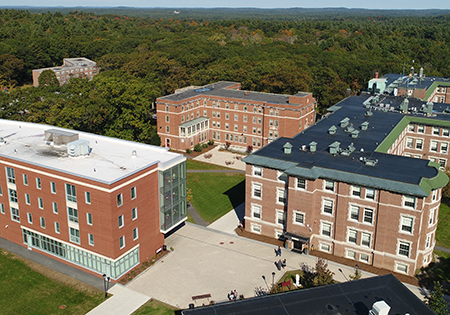 Photo: Maverick Productions, LLC
Photo: Maverick Productions, LLC
“Our mission is securely wrapped into our topical, timely, and true-to-the-profession approach to program development and delivery,” Tomaino says. “We fully understand the level of commitment needed to be successful in pursuing an advanced degree. As such, we have embraced our own commitment to the student experience by listening to students’ needs, addressing relevant issues, and being flexible with the times and market demands.”
That philosophy has worked. According to Tomaino, the reputation of on-campus graduate programs far surpasses regional recognition and draws students from around the country to on-campus programs (which offer a hybrid component with online course options).
“Flexible course formats for on-campus programs offer the ideal balance of on-campus and online learning; all of our on-campus programs embody a hybridized modality,” she says. “We also permit non-matriculated students to take up to two graduate courses for most programs prior to applying or being accepted; this option allows them to ‘test the waters’ prior to making the full commitment to a degree program.”
Tomaino also believes that what is happening behind the scenes is just as important. During the past three years, internal operations and external outreach efforts have grown to create what she calls “a dynamic strategy for program relevancy, creation, and sustainability.” Investing in a new customer relationship management system, for example, has been “a game changer,” boosting the number of applications by 50 percent for on-campus graduate programs from 2017 to 2018.
Regis Partnerships
The Regis Strategic Partnership program includes more than 100 partnerships with area health systems, school districts, corporations, non-profits, and other colleges and universities to offer employees of the institutions educational opportunities at Regis at reduced tuition rates.
“Our partnerships promote enhanced recruitment and retention as well as internal development and professional growth at no additional cost to our partners,” says Amy Etheridge, director of graduate program partnerships. “We take a customized and consultative approach to every new partnership, designing a program, marketing materials, and communication of the agreement to meet the needs of the organization and workforce.”
In spring 2019, Regis had more than 116 graduate students enrolled from new partnerships coming from 23 different organizations.
“A focus on formal partnerships with employers and with other undergraduate institutions has created new pipelines for incoming students,” says Kate Sutherland, vice president of graduate affairs and enrollment. “Within the past two years, for example, Regis has developed partnerships with 25 large regional employers, including hospitals and industry leaders in health care and education.”
Having staff members devoted to orientation and advising, she adds, has played a key role in retaining students. Career Services staff dedicated to working solely with Regis’ graduate population helps ensure that their graduate degree moves them up their career ladder.
“By bolstering our career services, partnership, and recruitment efforts, we have been able to serve both employers and employees,” Tomaino says. “We educate organizations on what we can offer to their employees; the organizations educate us on what needs they see in their industries and how we can assist via education and training. The employees then receive advanced education via our graduate programs-everyone can benefit.”
Partnerships have also provided insight into market demand and informed certificate programs in perioperative nursing, addictions, and nursing leadership.
“Given the foundation already built within each of our four schools, including cross-disciplinary courses, we have the structure to contemplate, investigate, and incorporate other programs to meet upcoming market demands on the graduate level,” Tomaino says. “By playing to our strengths, partnering with industry leaders, collaborating with other institutions of higher education, and optimizing available technology, Regis has the ability and tools to work well and succeed with on-campus graduate programs now and in the future.”
Profiles
Conway Campbell Sr. ’19
Regis Program: Doctor of Education (EdD)
Profession: Dean of Students at Assumption College (Vice President for Student Success effective July 1, 2019)
Hometown: Manchester, Jamaica
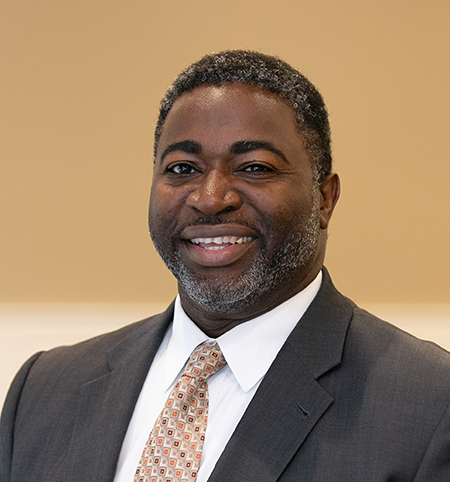 Photo: Courtesy of Assumption College
Photo: Courtesy of Assumption College
Why were you interested in the EdD program at Regis? For several years I considered a terminal degree-which has been a lifetime goal of mine-and had begun to search in the region for a good program. My primary goals were to learn research skills, improve my writing, collaborate with a cohort, and increase my higher education knowledge. With my busy schedule, Regis’ flexible weekend model with online courses was very desirable.
How has it been juggling school, family, and work? I had to be very disciplined with my studies. In addition to being a doctoral student, I am a dean of students, a husband, father, and pastor. My supervisor and colleagues at Assumption College were very supportive, and I was able to take one day off every other week to keep up with school work. My family has also been very supportive and understanding with my increased responsibilities. I can’t thank my wife enough-she read all my papers and offered useful suggestions.
Has the EdD program impacted your career? I was promoted to the inaugural vice president for student success at Assumption College. Coursework at Regis helped me learn about critical thinking and analysis.
The biggest impact is my increased higher education knowledge and being able to contribute at greater levels at Assumption. I have been asked to serve on several committees to help implement initiatives geared at student success, including the college retention committee and the presidential committee on racial and ethnic diversity, both of which I will chair.
What are the biggest things that Regis provides that you believe allowed you to soar to new heights? The faculty support in the EdD program is second to none, and the cohort structure was an important component of my selection of the Regis EdD program. The idea behind a cohort structure is that the group begins the program together, takes the same courses, and progresses to dissertation and defense at the same time. The benefit is that members of the cohort can support and encourage each other through the process. There are countless examples of members reaching out to others for help on projects or to ask advice.
What’s your goal as a higher education leader? To serve students and see them succeed.
Kristina Granito ’20
Profession: Registered Nurse at Boston Medical Center Surgical Step-Down Unit
Regis Program: Master of Science in Nursing Family Nurse Practitioner Program
Hometown: Danvers, Massachusetts
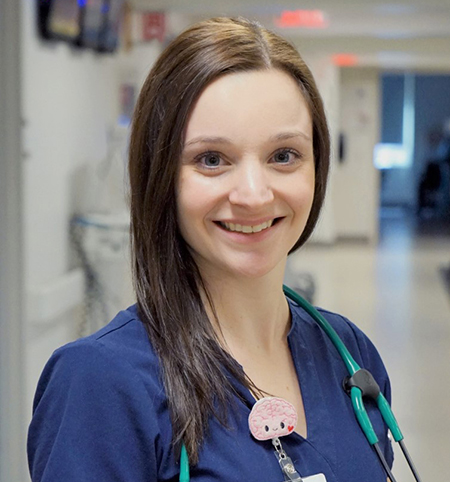 Photo: Erlyn Ordinario
Photo: Erlyn Ordinario
Why did you choose to pursue your education at Regis? I wanted to challenge myself at an institution that puts students first. I am able to gain a higher level of education in a welcoming, warm atmosphere that reminds me of my undergraduate private, catholic education.
What program are you in and what do you hope to achieve with your Regis degree? I am enrolled in the MSN Family Nurse Practitioner track. I hope to take care of patients at a higher level of care to make a positive influence in their life, promote health, and treat illness.
What role did the Regis/Boston Medical Center (BMC) preferred partnership play? What kinds of benefits have you found helpful? The partnership highlights the integration of the full-time nurse and student. It recognizes the challenge of being an active employee of BMC and a student and assists financially to help accommodate these challenges.
What’s your advice to students who are thinking of taking advantage of a partnership such as this? Balancing working as a nurse while earning a graduate education is not an easy task, but find an employer and a school that want you to succeed and with hard work it can be done. As I am pursuing my own education, I am currently precepting a Regis undergraduate nursing student which is a great way to stay connected with and help other students.
Are you doing an on-campus and online (hybrid) program? I am doing a hybrid format, which means I have class on campus at least once a week and get to interact with my peers and professors, but I also get to do some work online so I can better balance my work and school schedule.
Why does it make sense for BMC to partner with an institution like Regis? BMC’s motto is “Exceptional care without exception.” We provide warm, optimal care to all patients alike. Regis welcomes every student and faculty member and promotes giving to all. Both engage in many projects to better serve our community. My education at Regis and career at BMC are two major aspects of my life. The two institutions sharing a partnership and value of serving our community and dedication to hard work and a higher education has helped me flourish and strive to be a nurse practitioner.
Online Graduate
January 2017 marked the launch of fully online degree programs at Regis. It opened opportunities to a new audience by greatly expanding Regis’ geographic reach.
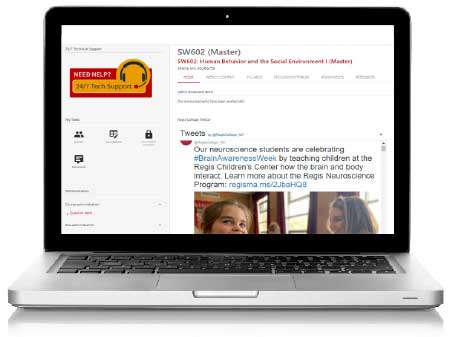
“The decision to develop a fully online graduate program was strategic, given data that indicate the increasing population of adult students expected to enroll in graduate programs,” says Associate Vice President of Online Learning Jonathan Small of efforts to build fiscal strength. “But it also aligned with the Regis mission to provide access to education to all people without distinction. It just made sense.”
Associate Dean of Online Assessment and Faculty Development Ericka Hollis, PhD, agrees. “The current demand for online education is being met by more than 1,000 degree-granting institutions including public, private, and for-profit institutions-thus creating intense competition in a limited marketplace. Regis is now a contender in this marketplace.”
Regis College’s online degree programs were founded on the university’s core strength in nursing-more than 90 percent of students are in one of the four nursing degrees (which require in-person clinicals with patients in health care settings) offered-balanced with several programs in the health sciences as well. Since its founding, the online offerings have grown from one to eight programs, with plans to launch two additional in fall 2020: a master’s in cybersecurity and a master’s in accounting.
Small says that many online students are adults looking to grow or transition their career-a group often juggling a full-time job and family. Students are from 39 different states and areas such as the Virgin Islands and military bases in Europe and the Pacific. The program director of the master’s in social work, Donette Considine, PhD, LCSW, is based in Illinois; faculty members are based in Georgia and Germany. “It brings a diversity of people and a diversity of thinking to the program.”
But the geographic diversity of an online program can also bring challenges: keeping students and faculty connected to the campus community, for example.
“We created an online task force to look at policies and procedures around faculty and also opened up seats on all faculty committees for online faculty to participate,” Small says of community-building initiatives. Regis also has an online faculty committee comprised of faculty who teach in fully online degree programs as well as on campus.
There are numerous online graduate programs. Students have said that their choice was based on accessibility and our reputation, but also the fact that they will learn how they can make a positive difference in the world.
Jonathan Small, Associate Vice President of Online Learning
Both faculty and students use Zoom video conferencing software to connect virtually. When students collaborate on group projects, for example, they use Zoom instead of meeting in a classroom or the library, allowing them to see each other and interact synchronously much like they would in a face-to-face meeting or classroom.
“They build a community amongst themselves,” Small says, noting that President Hays was impressed by online faculty members’ camaraderie and appreciation of the Regis mission when they came to campus during 2018 Commencement week.
“Our mission is built into the curriculum,” he says. “We’ve built in aspects of our core values like social justice and helping the dear neighbor so when faculty and students talk about health policy, for example, this is part of the lens they’re looking through.”
It’s one reason many students choose Regis in the first place, he adds. “There are numerous online graduate programs. Students have said that their choice was based on accessibility and our reputation, but also the fact that they will learn how they can make a positive difference in the world.”

Alumni Discount: Online Graduate Degrees
Regis alumni receive a 10% tuition discount on online graduate programs.
Online degrees include:
Profile
Kayla Wilson ’20
Profession: Registered Nurse
Regis Program: Post-Master’s Nurse Practitioner (MSN with NP Specialty)
Hometown: Westborough, Massachusetts
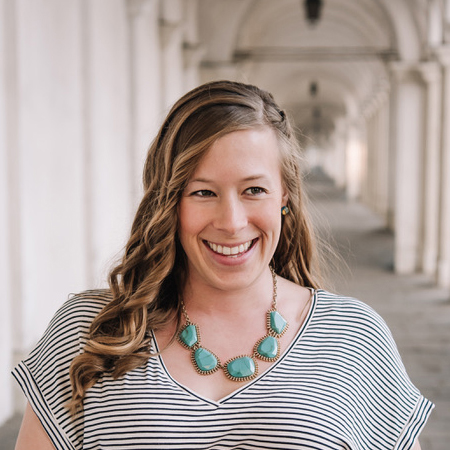 Photo: Isa Wigger
Photo: Isa Wigger
Why were you interested in online learning? I am a military spouse living in Vicenza, Italy, with my husband and wanted to continue my education while keeping my family together.
What program are you in and what do you hope to achieve with your degree? I enrolled in the Post-Master’s Nurse Practitioner (MSN with NP Specialty) program; I hope to become a pediatric nurse practitioner. I have been a pediatric nurse for five years now and have seen how any form of continuing education can be used to better serve my patients. I have worked with many nurse practitioners who truly inspired me to purse my NP degree. I had mostly worked acute care my first few years as an RN. However, the past two years I have worked in primary care/community health. I have seen firsthand the invaluable benefit of prevention and education and therefore decided to begin the primary care track.
How do you stay connected to your professors? Skype for business or other forms of video conferences has been the most helpful in getting to know them virtually and communicating more clearly. After the first few weeks in an elective class that I had been taking, I Skyped with the professor because I was overwhelmed by the time commitment of the program. My professor reassured me that I was performing very well and that the quality of my work was right on track.
How has the Regis mission informed your education? I am a practicing Catholic, and my faith plays an integral part in my daily life, in shaping my values as a registered nurse, and in my mission to use the education and experiences I have been blessed with to serve others. Working as a medical provider is accompanied by a variety of ethical and social issues, and with the broadened scope of practice and increased responsibilities of an NP, I anticipated that these issues would be even more prevalent and challenging. Issues such as contraception, euthanasia, artificial insemination, and women’s rights issues have all come up in my classes so far.
What’s your advice for online students to get the most out of their learning and their professors and fellow students? Maintain a job in their field of study to be able to put information learned into practice and stay current in the ever-changing field of medicine and health care.
Read more articles
Read the entire magazine online